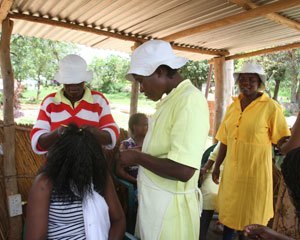
CHIKURUBI Female Prison is an isolated community, hardly any news filters there, but like any community, the rumour mill keeps on grinding.
BY NQABA MATSHAZI
There is excitement on the forthcoming elections, but not because the women there are looking forward to voting, but rather they are praying for an amnesty.
Like previous years, the female inmates hope President Robert Mugabe will declare an amnesty, freeing them from gaol and so elections cannot come any sooner.
“That is why it is called amnesty international,” an inmate identified as Doreen says, confusing an international non-governmental organisation with a general amnesty.
“It is international practice that before elections are held prisoners are freed. Since female prisoners are considered less dangerous, we will be the first to benefit from the amnesty.”
Doreen, who in 2006 was convicted for fraud involving money worth about US$3 during the Zimbabwe dollar era, does not allow her enthusiasm to be watered down by the fact that no one seems to know when elections are going to be held.
But she prays that it is before September.
- Harare prisoners cry foul
- Harare prisoners cry foul
- Govt urged to legalise vending
- MP takes Chiwenga to task
Keep Reading
Doreen says Mugabe, who was away on leave, is back at work and they hope that top on his agenda is granting an amnesty.
Describing the rumour mill as “Chikurubi Networks”, Doreen seems to be informed about what is happening in the outside world, albeit wildly inaccurate.
As if to illustrate how wild the rumours at the female prison can get, they also hope that prisoners can be freed so that they return to society to help rebuild the economy.
“Our economy is down, but there are so many intelligent and educated prisoners who will be freed so they can help rebuild it,” Doreen, who said she was studying for a Master’s Degree in Business Administration, explains, adding that this was an agreement between Zanu PF and the MDC parties.
At the female prison, information comes at a premium, with prisoners who would have gone to court being the source of news and bringing excitement.
Another prisoner exclaimed that the mood was lifted recently when they heard that Zimbabwe Prison Services boss, Paradzai Zimondi had revealed that land for a female open prison had been identified and construction would commence soon.
Inmates are already tipping themselves to be relocated to the open prison, which has fewer restrictions than a conventional prison. Just on the fence of the prison, there is a makeshift saloon, another goldfield for news.
Female prisoners, who are good at hairdressing, often interact with people on the outside, while they do their hair and often get to hear the latest news, which they spread to other inmates.
At about 2pm, it is time for the nursing mothers to have their babies weighed in and from the chatter, it was clear that the rumour mill was grinding as they spoke excitedly among each other, as they took their babies to the small clinic on the premises.
While prison is a scary place to be, some inmates have made peace with their surroundings and they dread their release date, not knowing what it would be like outside.
One such prisoner is Elinatha Masiwa, a 72-year-old woman, who was convicted of killing her mother in a drunken stupor.
“We are kept well here, we have food and shelter, I am not so sure how the outside world will be,” she said, adding that she will be released next year.
Conditions at the female prison are predictably freer than those at male prisons, but that does not mean the women commited lesser crimes.
Most women at the female prison were convicted of very serious crimes like murder, stock theft and aggravated sexual assault.
One of the excuses for stock theft, the prison officers revealed, was that inmates claimed the “beasts had just followed them” and that they had not stolen them.
Margaret Morapedi, a Botswana national, is probably the longest serving woman at the female section. She was convicted for robbery in Beitbridge in 2001 and was sentenced to 18 years in prison. She still has seven more to go.
“When I was arrested, my last born was 10, now he is 21,” she said wistfully.
Morapedi has no complaints of her stay in prison, although she laments being away from her family and her home.
“Being in a foreign territory is not easy,” she said.










